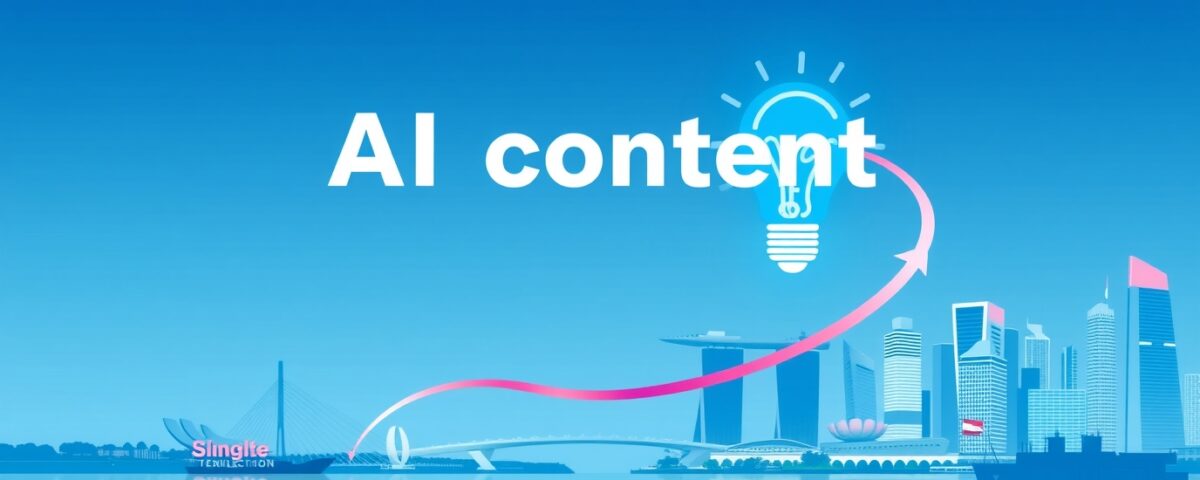
Singapore B2B Growth Hacks: What a Lead Generation Agency Really Does
November 18, 2025
How to Drive High-Quality B2B Leads in Singapore with the Right Agency
November 19, 2025Singapore’s Marketing Game Is Changing—Fast
Singapore has never been a city that waits for change—it builds it. And nowhere is this more obvious than in the way businesses now approach modern marketing. The rise of AI Content Generation is reshaping how brands think, create, and communicate. It’s not hype. It’s evolution.
Marketing used to be a slow craft—briefs, drafts, revisions, meetings. Today? Audiences move at the speed of a swipe. They expect clarity, relevance, and value instantly. Brands that can’t deliver get buried under the noise. That’s why Singapore’s adoption of AI Content Generation has surged. It brings speed where delays used to exist, precision where guesswork used to dominate, and scale where limits used to choke growth.
But make no mistake—AI isn’t a magic shortcut. It’s a tool for creators who know what they want to say but need to move faster and smarter. It challenges marketers to rethink how they work, how they plan, and how they tell stories that stand out in a crowded digital landscape.
Singapore’s culture of innovation makes this shift natural. From SMEs to large enterprises, more teams are merging creativity with machine intelligence, leaning on AI Content Generation to amplify their voice, not replace it.
This introduction sets the stage for the deeper truth: marketing is entering a new era—and Singapore is stepping into it early, confidently, and strategically.

Why AI Content Generation Matters for Modern Singapore Businesses
Singapore’s business environment is competitive, fast-paced, and built on execution. Every industry—finance, education, retail, real estate, healthcare—relies on communication to win trust. And with an audience that’s digitally mature, brands must deliver content that’s sharp, timely, and consistent. That’s why AI Content Generation is becoming a necessity, not a novelty.
Modern marketing demands volume: emails, landing pages, social posts, product descriptions, scripts, newsletters, guides. Most teams simply can’t keep up manually. AI bridges that gap. It handles the heavy lifting, the repetitive edits, the structural groundwork—freeing creators to focus on strategy and storytelling.
Singapore’s cultural diversity also means businesses must communicate across languages and contexts. Whether it’s English, Mandarin, Malay, Tamil, or local nuance, AI helps marketers adapt quickly. With the right prompts, AI Content Generation can reframe messaging for specific audiences—without sacrificing clarity.
This isn’t just about speed. It’s about relevance. Attention spans are shorter, and expectations are higher. Brands can no longer rely solely on one-size-fits-all messaging. AI helps personalize content at scale—something that used to require entire content teams.
When deployed wisely, AI Content Generation becomes the backbone of a modern marketing ecosystem—one where humans lead with creativity while AI powers the engine.

Singapore’s Top Benefits of AI-Powered Content Creation
Businesses in Singapore are discovering that the value of AI Content Generation extends far beyond simple time savings. The benefits are deep, structural, and transformative.
The first major advantage is speed. Marketing windows are shorter than ever. AI helps teams push out fresh content in minutes instead of days. It becomes easier to experiment, test messaging, and pivot quickly when market trends shift.
Next is personalization. Singapore’s audiences are diverse and segmented. AI allows brands to produce content that caters to micro-groups—adjusting tone, intent, and detail based on customer needs. What used to take multiple writers can now be done with one marketer and a smart AI workflow.
Cost efficiency is another powerful benefit. SMEs, in particular, often struggle with limited manpower. With AI Content Generation, even a small team can maintain a high-output marketing engine that rivals larger competitors.
Consistency also improves. AI ensures that every message follows brand direction, tone, and clarity—reducing the risks that come from human fatigue or inconsistency.
And finally, AI unlocks creativity. When the groundwork is automated, marketers can dive deeper into ideation, storytelling, and strategy. They can explore angles that previously felt too time-consuming to attempt.
In short, AI helps Singapore businesses move faster, sound smarter, and operate leaner—without sacrificing quality.

The Tools Singapore’s Marketing Teams Rely On Today
Singapore’s marketing teams are rapidly adopting technologies that help them stay ahead, and the core of this shift centers around AI Content Generation. These tools empower marketers to create more with less friction and fewer bottlenecks.
All-in-one AI writing platforms provide the foundation. They help teams brainstorm, rewrite, refine, and produce long-form articles at scale. These platforms eliminate the dreaded blank-page moment and help marketers accelerate their workflow.
For local brands aiming to sharpen their voice, AI Content Generation tools also support brand-guided content. Marketers can feed brand guidelines or examples, and AI mirrors the tone, style, and persona consistently across all marketing channels.
Visual content is another area where AI tools shine. Singapore’s social media landscape is highly competitive across LinkedIn, TikTok, Facebook, and Instagram. AI simplifies the production of visuals, captions, and scripts—allowing marketers to maintain relevance and frequency without burning out.
For multilingual demands, AI quickly adapts content for Chinese, Malay, and Tamil-speaking audiences. Brands can maintain accuracy and cultural sensitivity while scaling communication into different demographics.
Whether it’s for speed, consistency, or creative direction, the modern Singapore marketing stack increasingly relies on the backbone of AI Content Generation to stay competitive.

Singapore Companies Use AI to Build Smarter Content Strategies
Across Singapore’s industries, companies are incorporating AI Content Generation into their long-term strategies—not just as a content tool, but as a growth engine.
For social media, AI helps teams generate scripts, captions, visuals, hashtags, and variations for A/B testing. This allows brands to publish more consistently and stay visible without sacrificing quality.
For SEO, companies rely on AI to produce optimized long-form content designed to capture organic search traffic. AI helps outline topics, refine keyword density, and maintain structure—essential for ranking in competitive niches like real estate, finance, and education.
Email marketing is another major application. AI helps personalize subject lines, introductions, and calls to action. This boosts open rates and engagement, particularly in ecommerce and SaaS sectors where relevance drives conversions.
Chatbots and customer support automation are also rising in popularity. Many retailers, clinics, and service providers use AI-generated scripts to maintain a consistent tone and offer fast responses.
Enterprise teams go even further. They use AI to map customer journeys, predict behaviors, and build content that supports each stage of the buying process.
The common thread is clear: Singapore businesses aren’t just creating more content, they’re building smarter systems powered by AI Content Generation to improve performance across the entire marketing funnel.

The Hard Truth: Challenges & Ethical Questions in AI Marketing
As powerful as AI is, there are challenges that Singapore businesses must face head-on. The first is originality. AI can generate clean, coherent content quickly—but unchecked reliance can dilute brand personality. Companies must guide it with strategy, not depend on it blindly.
Data sensitivity is another issue. Singapore’s PDPA creates strict guidelines for data privacy and proper use. Brands must ensure that their AI Content Generation tools handle information responsibly and securely.
Then there’s accountability. AI can produce misinformation or inaccuracies if not supervised carefully. Human oversight remains critical to maintain integrity, accuracy, and trust.
Ethics also come into play. Customers want authenticity. They want to know there’s a human behind the brand. AI should assist—not pretend to be the creator.
Finally, there is the challenge of cultural nuance. Singapore’s diverse audience requires sensitivity across languages, tone, and context. AI must be guided, corrected, and trained to respect these cultural touchpoints.
In short, AI Content Generation is a powerful tool—but it becomes dangerous without discipline, ethics, and strong human leadership.
Conclusion: The Future Belongs to Brands Who Adapt Early
Marketing in Singapore is entering a new era—one shaped by intelligence, agility, and bold experimentation. The brands that thrive will be the ones that embrace AI Content Generation not as a shortcut, but as a strategic accelerator.
AI won’t replace marketers. But marketers who understand AI will outperform those who ignore it. The combination of human creativity and machine efficiency forms a competitive edge that traditional workflows simply cannot match.
Singapore has always led with innovation. Now, it leads with intelligent marketing. The future belongs to teams who adapt early, stay curious, and use AI to amplify—not overshadow—their voice.
The next chapter of marketing starts here.


